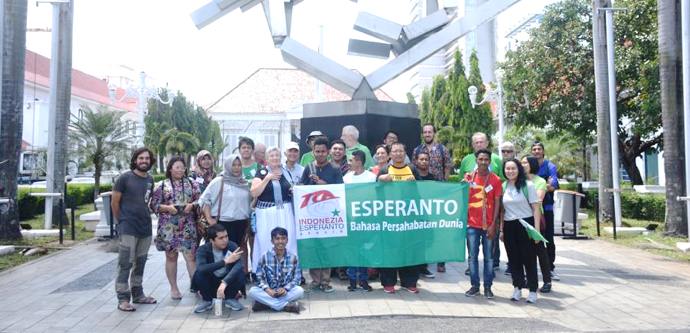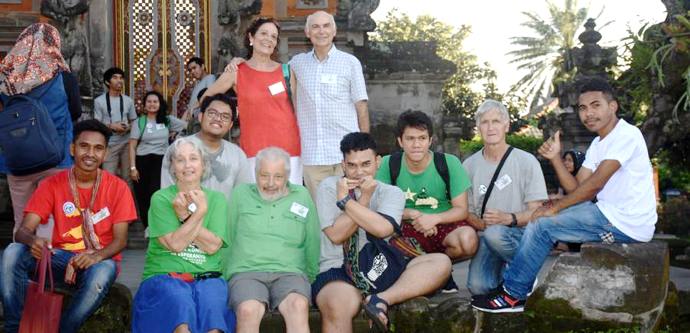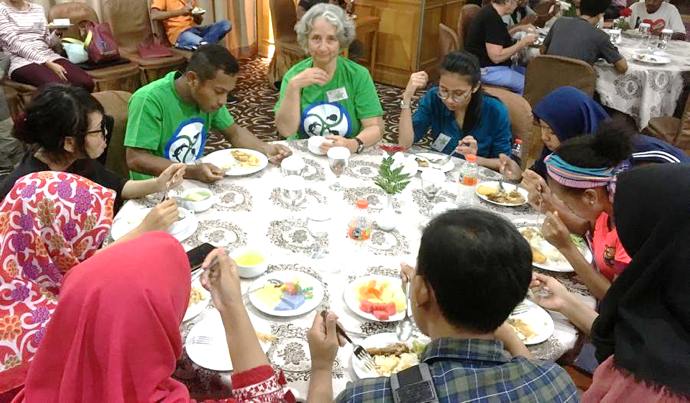Report on the Second Three-country Congress in Bekasi, Indonesia
From 28 March to 2 April 2018 the second three-country congress took place in the city of Bekasi, which is located 55.6 km from the international airport in Jakarta.
Most congress participants from other countries have never heard of the city and have no idea what it is like. However, I proposed the city to the other organisations from Australia and New Zealand because there are young people in this second big city of West Java who have already learned Esperanto in a linguistic community, Faktabahasa Bekasi. Besides that, some young activists live in Bekasi and were prepared to work to organise the congress.
This time the congress was smaller than the last three-country congress, in Bandung in 2016. Thirty-seven Indonesians participated and 29 people from 7 other countries: Australia, New Zealand, Belgium, Spain, Korea, Philippines and East Timor. Among the congress participants there were newcomers and young people from various parts of Indonesia. We successfully sponsored them because of a special UEA account (iesa-p). Thank you very much to Esperantists who have already supported our movement with that account. It was also great that ten East Timorese came thanks to a subsidy, which was arranged by Heidi Goes.
On the evening of the first day, the congress opened with a bit of ceremony. The organisers from three countries welcomed the congress participants. Between them, a young Indonesian read an Esperanto poem and the group of East Timorese sang their traditional song beautifully. Then all the speakers had the opportunity to invite congress participants to their lectures and finally we together sang the hymn, La Espero. The program continued with fun games in the ice-breaker evening.
The following day, a number of important lectures took place, such as a talk by Humphrey Tonkin, who talked about the current situation of Esperanto in the world, and a speech by the president of UEA, Mark Fettes, about the current situation of UEA and Esperanto in the world. These lectures were well arranged using Skype. At the same time, in other rooms, two invited teachers taught Esperanto to beginners and more advanced language-learners. The courses took place four times for three hours at a time. Other interesting lectures were also presented by people from the Philippines, Australia and Spain. We also gave an opportunity for beginners to give talks, so that they might have the courage to speak the language.
On 30 March, when it was an Easter holiday in Indonesia, more Indonesians were able to attend the congress. There was a lecture again with Skype and this time, Jonathan Cooper from Australia talked about how to write for the electronic medium. Then, several talks about culture, interesting topics enriched the knowledge of congress participants. In the evening, the East-Timorese group presented an artistic show. They sang, danced, even performed magic. Following the program it continued like an ‘Arta Vespero’, as in a World Congress. The congress participants showed their artistic presentations singly or in groups. Together with some participants from other countries, we danced a traditional dance from Indonesia.

In front of the National Art Gallery, Jakarta
During the excursion day that took place on Saturday, we went to Jakarta to visit the national gallery, which exhibits art. Then the participants also visited the national museum and “Taman Mini Indonesia Indah”, which is recommended to learn something about the diversity of Indonesian culture. In the evening, the participant from Bali spoke about his Esperanto activity and then there was a language festival, the purpose of which was to learn and practise some other languages. Young Indonesians have been very enthusiastic about this program because they are very interested in using languages.

In front of the Bali House at “Taman Mini Indonesia Indah”
On 1 April, a group of congress participants took part in the vehicle-free day, which takes place each Sunday morning. Between 6am and 10am cars are banned from the main street of Bekasi and during these four hours the street abounds in pedestrians, cyclists and joggers. For an hour we used the event to promote Esperanto to the public. In order to catch the attention of the people around us, we walked with a congress banner, sang and danced together. A few people came up and asked about Esperanto and our activity.
An impressive talk about the history of the Indonesian Esperanto movement was presented by Heidi Goes, based on her nearly completed book. She has explored many details about various Indonesian Esperantists, places and events. The book can therefore be a good way to discover Esperanto’s existence in Indonesia.

Eating together – often the best part of a congress
After that, Carlos Spinola lectured on the use of Esperanto in the University of Valencia in Spain, and the Cassini project. Other lectures were also interesting, such as a talk by Park Soohyean, about the food customs of the Korean traditional festival day, and a look at songs from lyricist’s point of view, by Kam Lee from Australia. In the evening we went together to a restaurant for the banquet.
During the last day, in the morning, the closing ceremony took place. Then the participants had the opportunity to comment on their impressions, opinions or criticisms. We would say that the congress was successful because participants’ comments were mainly positive. During the closing ceremony, many people emphasised the fact that the valuable aspect of the congress was friendship. For the third congress, we began to explore the possibility of establishing a joint event in Bali after two or three years.
Ilia Sumilfia Dewi : ilia.dewi@gmail.com
Indonesian Esperanto Association
